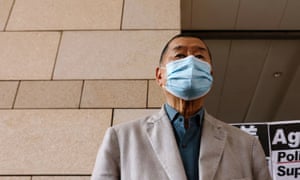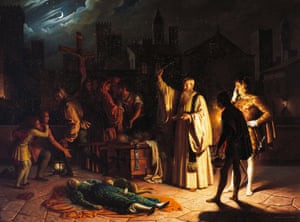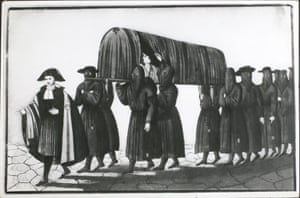Jonathan Swan AXIOS
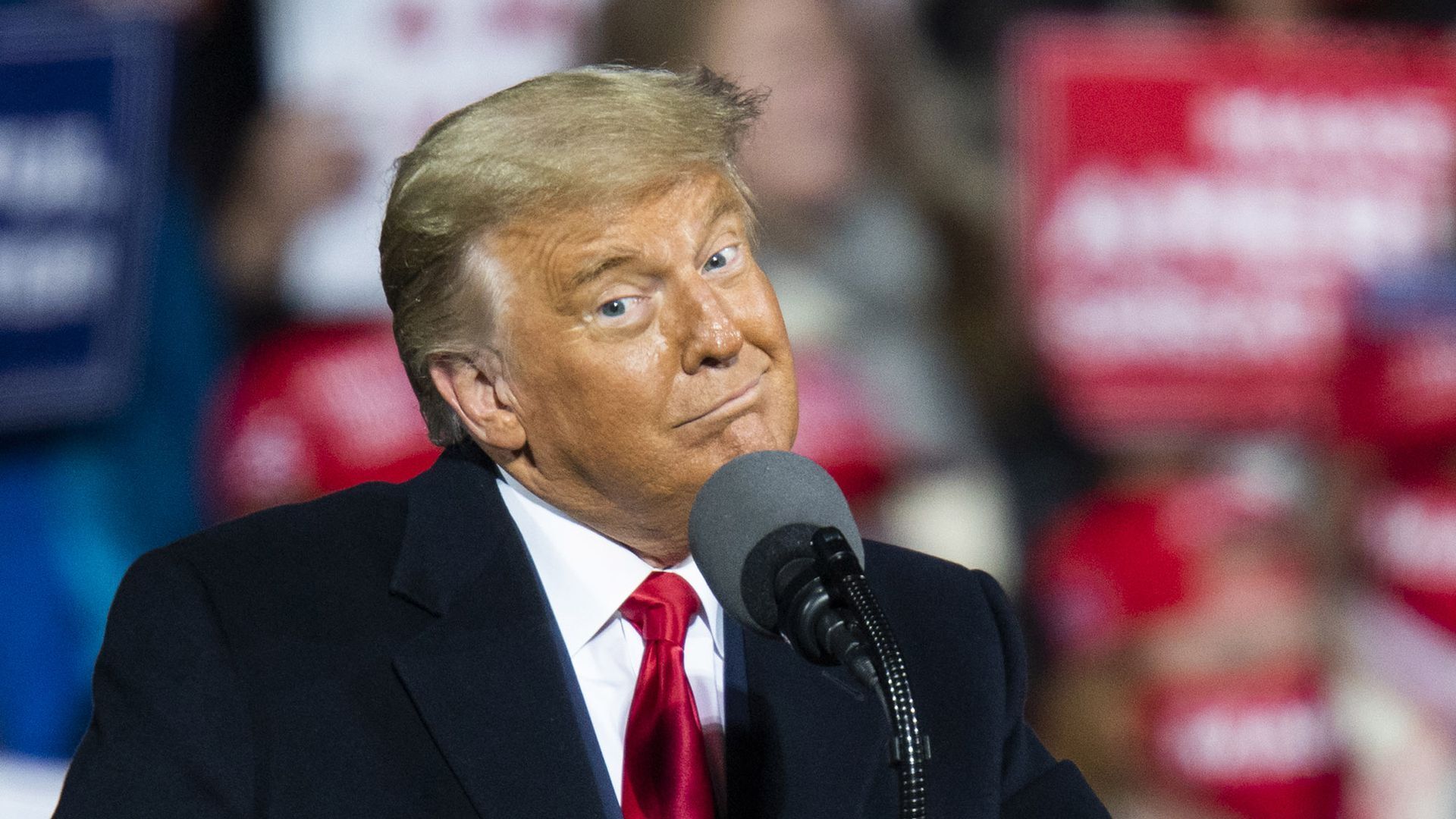
Photo: Eduardo Munoz Alvarez/Getty Images
President Trump has told confidants he'll declare victory on Tuesday night if it looks like he's "ahead," according to three sources familiar with his private comments. That's even if the Electoral College outcome still hinges on large numbers of uncounted votes in key states like Pennsylvania.
The latest: Speaking to reporters on Sunday evening, Trump denied that he would declare victory prematurely, before adding, "I think it's a terrible thing when ballots can be collected after an election. I think it's a terrible thing when states are allowed to tabulate ballots for a long period of time after the election is over."
He continued: "I think it's terrible that we can't know the results of an election the night of the election. ... We're going to go in the night of, as soon as that election's over, we're going in with our lawyers."
"We don't want to have Pennsylvania, where you have a political governor, a very partisan guy. ... We don't want to be in a position where he's allowed, every day, to watch ballots come in. See if we can only find 10,000 more ballots."
Behind the scenes: Trump has privately talked through this scenario in some detail in the last few weeks, describing plans to walk up to a podium on election night and declare he has won.
For this to happen, his allies expect he would need to either win or have commanding leads in Ohio, Florida, North Carolina, Texas, Iowa, Arizona and Georgia.
Why it matters: Trump's team is preparing to falsely claim that mail-in ballots counted after Nov. 3 — a legitimate count expected to favor Democrats — are evidence of election fraud.
Details:
Many prognosticators say that on election night, Trump will likely appear ahead in Pennsylvania — though the state's final outcome could change substantially as mail-in ballots are counted over the following days.
Trump's team is preparing to claim baselessly that if that process changes the outcome in Pennsylvania from the picture on election night, then Democrats would have "stolen" the election.
Trump's advisers have been laying the groundwork for this strategy for weeks, but this is the first account of Trump explicitly discussing his election night intentions.
What they're saying: Asked for comment, the Trump campaign's communications director Tim Murtaugh said, "This is nothing but people trying to create doubt about a Trump victory. When he wins, he's going to say so."
Trump campaign senior adviser Jason Miller predicted that Trump "will be re-elected handily and no amount of post-election Democratic thievery will be able to change the results."
Reality check: Mail-in ballots counted after Election Day as set forth in state-by-state rules are as legitimate as in-person votes recorded on Nov. 3.
Many states won't be done counting mail ballots by Tuesday night.
In Pennsylvania, state law prevents election officials from counting mail-in ballots before Election Day.
Night-of counts may be deceptive. It could be days, if not weeks, before we know who won Pennsylvania. If it's a close race, this could also be true for other states, given the record numbers of Americans who voted by mail this year.
Pennsylvania Secretary of State Kathy Boockvar said on NBC's "Meet the Press" today that there could be 10x as many mail ballots this year than in 2016, "so, yes, it will take longer" to count.
"I expect that the overwhelming majority of ballots in Pennsylvania, that's mail-in and absentee ballots, as well as in-person ballots, will be counted within a matter of days," Boockvar said.
What we're watching: Miller, on ABC's "This Week," predicted 290+ electoral votes for Trump on election night, and he claimed Democrats are "just going to try to steal it back after the election."
He described any prospective challenges by Democrats as "hijinks or lawsuits or whatever kind of nonsense."
Between the lines: Trump advisers are more optimistic about winning than they were three weeks ago, based on my conversations with multiple senior campaign officials over the past week, including two officials with direct knowledge of sensitive internal data.
They said analyses of early-vote totals in battleground states indicate he's doing substantially worse in Iowa and Georgia compared with this point in 2016, but better than expected in Texas, Nevada, North Carolina, Arizona and Wisconsin.
Just a few weeks ago, senior Trump advisers were bearish about Wisconsin and had reduced TV advertising there to an insignificant figure. A senior campaign official told me, then, that the state didn't figure in his paths to 270 electoral votes.
But that appears to have changed. In recent days, senior Trump advisers have privately expressed growing optimism about Wisconsin, based on their analysis of early vote data.
The other side: “It comes as no surprise that Donald Trump and his campaign plan to declare victory before all the votes are counted. That has been his strategy for months, and nobody should fall for it,” Sen. Bernie Sanders said in a statement to Axios.
Biden Warns Trump Against Declaring Victory Early on Tuesday Night
By DANIEL POLITINOV 01, 2020
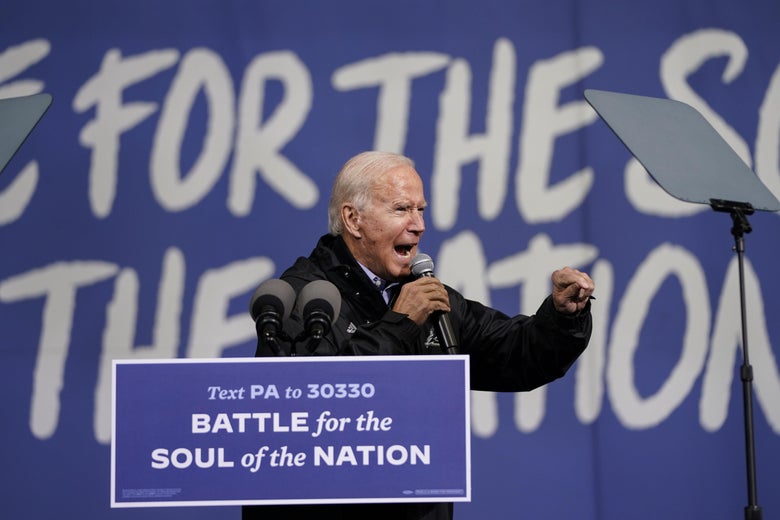
By DANIEL POLITINOV 01, 2020

Democratic presidential nominee Joe Biden speaks at a get out the vote event at Sharon Baptist Church on November 1, 2020 in Philadelphia, Pennsylvania.
Drew Angerer/Getty Images
Former vice president Joe Biden was asked Sunday night about a report that President Donald Trump is planning to declare victory early on Tuesday. “My response is the president is not going to steal this election,” Biden told reporters in Philadelphia. Earlier in the day, Sen. Kamala Harris said the goal of the Democratic campaign is to make sure the victory is so resounding that it won’t even be an issue. “First of all, we plan to decisively win this election so I don’t think we’re going to need to get to that point,” she told reporters in North Carolina.
Biden reacted after Axios reported that Trump is planning to get ahead of things and will declare victory Tuesday night if it looks like he’s “ahead.” Even if there are still lots of uncounted votes in key states like Pennsylvania, Trump has apparently told those around him that he will prematurely declare himself the winner, Axios reported, citing three anonymous sources.
People close to the president believe that Trump will be ready to declare himself the winner of the election if he has significant leads in Ohio, Florida, North Carolina, Texas, Iowa, Arizona, and Georgia. Simply declaring himself the winner wouldn’t actually change much, but it would allow him to challenge ballots from a position of perceived victory as there are more and more signs that the president’s allies will be arguing that mail-in ballots counted after Tuesday should not be valid.
Later Sunday, Trump denied he would prematurely declare victory but he also raised questions about the validity of ballots counted after Election Day. “I think it’s a terrible thing when ballots can be collected after an election. I think it’s a terrible thing when states are allowed to tabulate ballots for a long period of time after the election is over,” Trump said. The president added it was “terrible” to not know the results on the night of an election and previewed a long legal battle ahead. “We’re going to go in the night of, as soon as that election’s over, we’re going in with our lawyers.”
Former vice president Joe Biden was asked Sunday night about a report that President Donald Trump is planning to declare victory early on Tuesday. “My response is the president is not going to steal this election,” Biden told reporters in Philadelphia. Earlier in the day, Sen. Kamala Harris said the goal of the Democratic campaign is to make sure the victory is so resounding that it won’t even be an issue. “First of all, we plan to decisively win this election so I don’t think we’re going to need to get to that point,” she told reporters in North Carolina.
Biden reacted after Axios reported that Trump is planning to get ahead of things and will declare victory Tuesday night if it looks like he’s “ahead.” Even if there are still lots of uncounted votes in key states like Pennsylvania, Trump has apparently told those around him that he will prematurely declare himself the winner, Axios reported, citing three anonymous sources.
People close to the president believe that Trump will be ready to declare himself the winner of the election if he has significant leads in Ohio, Florida, North Carolina, Texas, Iowa, Arizona, and Georgia. Simply declaring himself the winner wouldn’t actually change much, but it would allow him to challenge ballots from a position of perceived victory as there are more and more signs that the president’s allies will be arguing that mail-in ballots counted after Tuesday should not be valid.
Later Sunday, Trump denied he would prematurely declare victory but he also raised questions about the validity of ballots counted after Election Day. “I think it’s a terrible thing when ballots can be collected after an election. I think it’s a terrible thing when states are allowed to tabulate ballots for a long period of time after the election is over,” Trump said. The president added it was “terrible” to not know the results on the night of an election and previewed a long legal battle ahead. “We’re going to go in the night of, as soon as that election’s over, we’re going in with our lawyers.”
Trump denies he will declare victory before results are in
Julian Borger in Washington and Martin Pengelly in New York
THE GUARDIAN
Sun 1 Nov 2020

Citing three anonymous sources “familiar with his private comments”, the news site Axios said Trump “has told confidants he’ll declare victory on Tuesday night if it looks like he’s ‘ahead’.
“That’s even if the electoral college outcome still hinges on large numbers of uncounted votes in key states like Pennsylvania,” the site said, adding: “Trump has privately talked through this scenario in some detail in the last few weeks, describing plans to walk up to a podium on election night and declare he has won.
“For this to happen, his allies expect he would need to either win or have commanding leads in Ohio, Florida, North Carolina, Texas, Iowa, Arizona and Georgia.”
Trump denied the Axios story, describing it at false, but then confirmed he would try to shut down vote counting as soon as the polls close on Tuesday.
“I don’t think it’s fair that we have to wait for a long period of time after the election,” the president told journalists in North Carolina “As soon as the election is over - we’re going in with our lawyers.”
Asked about the Axios report, Trump’s Democratic challenger, Joe Biden, said: “My response is the president’s not gonna steal this election.”
According to FiveThirtyEight.com, Trump leads in Ohio, Texas and Iowa while Biden is up in Florida, North Carolina, Georgia and Arizona. The races are all exceptionally tight: the biggest lead in the FiveThirtyEight.com polling average is Biden by three points in Arizona, the smallest Trump by 0.2 in Ohio.
Under the coronavirus pandemic, early and mail-in voting has reached unprecedented levels, fuelling expectations of record turnout but also fears many states will take longer than usual to count their ballots.
Trump’s tactics, Axios said, will depend on continuing to claim without evidence ballots counted after election day are illegitimate and evidence of voter fraud. Vote counting after election day is a regular feature of US elections.

A child holds a flag as supporters wait for the rally of Donald Trump at Hickory regional airport in Hickory, North Carolina, on Sunday. Photograph: Hannah McKay/Reuters
Many of Trump’s claims have focused on Pennsylvania, where the race is close but where votes counted after 3 November are expected to favour Biden who leads most national and battleground polls. Both candidates campaigned heavily in the state this weekend.
“Pennsylvania is critical to this election,” Biden told a drive-in rally in Philadelphia on Sunday evening, describing the president as an obstacle to defeating the pandemic.
“To beat the virus we’ve first got to beat Donald Trump,” he said “He’s the virus.”
Democrats have long worried that Trump will declare victory early, aiming to sow uncertainty and legal battles over ballots and results. Some observers have called the tactic the “red mirage”, which former housing secretary Julián Castro said this week “sounds like a super villain, and it’s just as insidious”.
“On election night, there’s a real possibility that the data will show Republicans leading early, before all the votes are counted,” Castro said. “Then they can pretend something sinister’s going on when the counts change in Democrats’ favour.”
Advertisement
On Sunday, on CNN’s State of the Union, Biden adviser Anita Dunn said she thought the victor would be known some time on 4 November, the day after election day.
“A lot of the early states that are battleground states, especially in the Sunbelt, Florida, Georgia, North Carolina, are states that tend to get their votes counted on election night,” Dunn said. “I think we will get some sort of indicator what kind of night it’s going to be from those three states. We will see. Obviously, Pennsylvania, Michigan, Wisconsin may be slower.”
The Pennsylvania official in charge of elections, Secretary of State Kathy Boockvar, a Democrat, told NBC’s Meet the Press there could be 10 times as many mail-in ballots than in 2016 and added: “I expect that the overwhelming majority of ballots in Pennsylvania, that’s mail-in and absentee ballots, as well as in-person ballots, will be counted within a matter of days.”
Axios said the Trump campaign was bullish about key states including Texas, Nevada, North Carolina, Arizona and Wisconsin. On ABC’s This Week, Trump adviser Jason Miller claimed: “If you speak with many smart Democrats, they believe President Trump will be ahead on election night, probably getting 280 electoral [votes], somewhere in that range. And then they’re going to try to steal it back after the election.
“We believe that we’ll be over 290 electoral votes on election night. So no matter what they try to do, what kind of hijinks or law suits or whatever kind of nonsense they try to pull off, we’re still going to have enough electoral votes to get President Trump re-elected.”
Miller’s claim rested on the idea that all ballots must be counted on election day, a legal and political nonsense. Nonetheless, the Trump campaign communications director Tim Murtaugh told Axios: “When he wins, he’s going to say so.”
Trump’s final 2020 tour, which began on Sunday in Michigan, is aimed at holding states he won four years ago and shoring up support in traditional Republican strongholds, like North Carolina and Georgia. Biden was due to hold two drive-in meetings in Pennsylvania, one of a string of former Democratic bastions in the north-east which Trump won from Hillary Clinton by less than a point.
New polls showed Biden holding on to a lead in Pennsylvania. The New York Times and Siena College gave the Democrat a six-point edge, while the Washington Post and ABC showed a seven-point margin
Julian Borger in Washington and Martin Pengelly in New York
THE GUARDIAN
Sun 1 Nov 2020

Donald Trump arrives for a campaign rally at Michigan sports stars park, in Washington, Michigan, on Sunday. Photograph: Evan Vucci/AP
Donald Trump embarked on a blistering final campaign sprint on Sunday, lining up 10 rallies in seven swing states over two days in an effort to defy the polls and replicate his shock election win in 2016. As he did so, it was reported that he is planning to declare victory on Tuesday, before the result is called.
Donald Trump embarked on a blistering final campaign sprint on Sunday, lining up 10 rallies in seven swing states over two days in an effort to defy the polls and replicate his shock election win in 2016. As he did so, it was reported that he is planning to declare victory on Tuesday, before the result is called.
Citing three anonymous sources “familiar with his private comments”, the news site Axios said Trump “has told confidants he’ll declare victory on Tuesday night if it looks like he’s ‘ahead’.
“That’s even if the electoral college outcome still hinges on large numbers of uncounted votes in key states like Pennsylvania,” the site said, adding: “Trump has privately talked through this scenario in some detail in the last few weeks, describing plans to walk up to a podium on election night and declare he has won.
“For this to happen, his allies expect he would need to either win or have commanding leads in Ohio, Florida, North Carolina, Texas, Iowa, Arizona and Georgia.”
Trump denied the Axios story, describing it at false, but then confirmed he would try to shut down vote counting as soon as the polls close on Tuesday.
“I don’t think it’s fair that we have to wait for a long period of time after the election,” the president told journalists in North Carolina “As soon as the election is over - we’re going in with our lawyers.”
Asked about the Axios report, Trump’s Democratic challenger, Joe Biden, said: “My response is the president’s not gonna steal this election.”
According to FiveThirtyEight.com, Trump leads in Ohio, Texas and Iowa while Biden is up in Florida, North Carolina, Georgia and Arizona. The races are all exceptionally tight: the biggest lead in the FiveThirtyEight.com polling average is Biden by three points in Arizona, the smallest Trump by 0.2 in Ohio.
Under the coronavirus pandemic, early and mail-in voting has reached unprecedented levels, fuelling expectations of record turnout but also fears many states will take longer than usual to count their ballots.
Trump’s tactics, Axios said, will depend on continuing to claim without evidence ballots counted after election day are illegitimate and evidence of voter fraud. Vote counting after election day is a regular feature of US elections.
CHILD ABUSE

A child holds a flag as supporters wait for the rally of Donald Trump at Hickory regional airport in Hickory, North Carolina, on Sunday. Photograph: Hannah McKay/Reuters
Many of Trump’s claims have focused on Pennsylvania, where the race is close but where votes counted after 3 November are expected to favour Biden who leads most national and battleground polls. Both candidates campaigned heavily in the state this weekend.
“Pennsylvania is critical to this election,” Biden told a drive-in rally in Philadelphia on Sunday evening, describing the president as an obstacle to defeating the pandemic.
“To beat the virus we’ve first got to beat Donald Trump,” he said “He’s the virus.”
Democrats have long worried that Trump will declare victory early, aiming to sow uncertainty and legal battles over ballots and results. Some observers have called the tactic the “red mirage”, which former housing secretary Julián Castro said this week “sounds like a super villain, and it’s just as insidious”.
“On election night, there’s a real possibility that the data will show Republicans leading early, before all the votes are counted,” Castro said. “Then they can pretend something sinister’s going on when the counts change in Democrats’ favour.”
Advertisement
On Sunday, on CNN’s State of the Union, Biden adviser Anita Dunn said she thought the victor would be known some time on 4 November, the day after election day.
“A lot of the early states that are battleground states, especially in the Sunbelt, Florida, Georgia, North Carolina, are states that tend to get their votes counted on election night,” Dunn said. “I think we will get some sort of indicator what kind of night it’s going to be from those three states. We will see. Obviously, Pennsylvania, Michigan, Wisconsin may be slower.”
The Pennsylvania official in charge of elections, Secretary of State Kathy Boockvar, a Democrat, told NBC’s Meet the Press there could be 10 times as many mail-in ballots than in 2016 and added: “I expect that the overwhelming majority of ballots in Pennsylvania, that’s mail-in and absentee ballots, as well as in-person ballots, will be counted within a matter of days.”
Axios said the Trump campaign was bullish about key states including Texas, Nevada, North Carolina, Arizona and Wisconsin. On ABC’s This Week, Trump adviser Jason Miller claimed: “If you speak with many smart Democrats, they believe President Trump will be ahead on election night, probably getting 280 electoral [votes], somewhere in that range. And then they’re going to try to steal it back after the election.
“We believe that we’ll be over 290 electoral votes on election night. So no matter what they try to do, what kind of hijinks or law suits or whatever kind of nonsense they try to pull off, we’re still going to have enough electoral votes to get President Trump re-elected.”
Miller’s claim rested on the idea that all ballots must be counted on election day, a legal and political nonsense. Nonetheless, the Trump campaign communications director Tim Murtaugh told Axios: “When he wins, he’s going to say so.”
Trump’s final 2020 tour, which began on Sunday in Michigan, is aimed at holding states he won four years ago and shoring up support in traditional Republican strongholds, like North Carolina and Georgia. Biden was due to hold two drive-in meetings in Pennsylvania, one of a string of former Democratic bastions in the north-east which Trump won from Hillary Clinton by less than a point.
New polls showed Biden holding on to a lead in Pennsylvania. The New York Times and Siena College gave the Democrat a six-point edge, while the Washington Post and ABC showed a seven-point margin
Photograph: Carlos Barría/Reuters
In Michigan, Trump repeated some of the messages that worked in 2016, highlighting the impact of globalisation on the car industry.
“I gave you a lot of auto plants, so I think we’re even,” he told a crowd at a wind- and rain-swept rally in the town of Washington.
One new car plant has been announced since Trump took office, while Michigan automotive jobs had fallen by 2,400 even before the Covid-19 pandemic. Employment in the sector is down more than 18,000 in the state, according to the Bureau of Labor Statistics.
Trump’s other principal line of attack was to warn voters Biden would implement a drastic lockdown that would kill jobs. The president has insisted the nation has “turned the corner” despite record numbers of new cases across the country, and warnings of a spike in deaths over the winter.
Trump has insisted on holding mass rallies with no social distancing, at which few wear masks. A study by Stanford University economists estimated at least 30,000 coronavirus infections and 700 deaths caused by 18 Trump rallies between June and September.
“We’re in for a whole lot of hurt,” Anthony Fauci, the country’s leading expert on infectious disease, told the Washington Post. “It’s not a good situation. All the stars are aligned in the wrong place as you go into the fall and winter season, with people congregating at home indoors. You could not possibly be positioned more poorly.”
A NBC and Wall Street Journal poll on Sunday put Biden up 10 points, a majority of voters saying they were unhappy with the president’s handling of the pandemic and the direction of the country. The same poll four years ago had Clinton up but by only four. In 2016 there were many more undecided and third-party voters.
The Trump camp has stepped up signals that they will look to Republican-leaning courts to cast doubt on the integrity of the enormous volume of postal ballots. In Texas, a federal court will hear a lawsuit on Monday aimed at having 117,000 votes in Houston thrown out because they were cast at curbside ballot boxes set up to make voting easier during the pandemic, which the Republican plaintiffs argue was illegal.
The Texas supreme court has twice rejected a similar argument but a federal court in Houston has agreed to hear the case, presided over by an ultra-conservative judge.
In Michigan, Trump repeated some of the messages that worked in 2016, highlighting the impact of globalisation on the car industry.
“I gave you a lot of auto plants, so I think we’re even,” he told a crowd at a wind- and rain-swept rally in the town of Washington.
One new car plant has been announced since Trump took office, while Michigan automotive jobs had fallen by 2,400 even before the Covid-19 pandemic. Employment in the sector is down more than 18,000 in the state, according to the Bureau of Labor Statistics.
Trump’s other principal line of attack was to warn voters Biden would implement a drastic lockdown that would kill jobs. The president has insisted the nation has “turned the corner” despite record numbers of new cases across the country, and warnings of a spike in deaths over the winter.
Trump has insisted on holding mass rallies with no social distancing, at which few wear masks. A study by Stanford University economists estimated at least 30,000 coronavirus infections and 700 deaths caused by 18 Trump rallies between June and September.
“We’re in for a whole lot of hurt,” Anthony Fauci, the country’s leading expert on infectious disease, told the Washington Post. “It’s not a good situation. All the stars are aligned in the wrong place as you go into the fall and winter season, with people congregating at home indoors. You could not possibly be positioned more poorly.”
A NBC and Wall Street Journal poll on Sunday put Biden up 10 points, a majority of voters saying they were unhappy with the president’s handling of the pandemic and the direction of the country. The same poll four years ago had Clinton up but by only four. In 2016 there were many more undecided and third-party voters.
The Trump camp has stepped up signals that they will look to Republican-leaning courts to cast doubt on the integrity of the enormous volume of postal ballots. In Texas, a federal court will hear a lawsuit on Monday aimed at having 117,000 votes in Houston thrown out because they were cast at curbside ballot boxes set up to make voting easier during the pandemic, which the Republican plaintiffs argue was illegal.
The Texas supreme court has twice rejected a similar argument but a federal court in Houston has agreed to hear the case, presided over by an ultra-conservative judge.

